Seven Days’ Leave (1942): “Please won’t you leave my girl alone…”
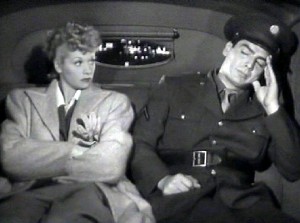 At 7:30am EDT this Saturday morning, July 7th, Turner Classic Movies will show the 1942 WW2 musical comedy Seven Days’ Leave (1942), starring Victor Mature and Lucille Ball It’s a romantic comedy whose premise seems to have been borrowed from the Buster Keaton classic Seven Chances (1925): Mature is GI Johnny Grey, who stands to inherit $100,000 from a distant relative…but only if he marries heiress Terry Havalok-Allen (Lucy) within the titular time frame. Mature’s great-great-grandfather was engaged to be married to a gal in Lucy’s family, but the Civil War put the lovers on opposite sides…yet a codicil in great-great-grandpappy’s will states he has to marry someone in the Havalok-Allen clan or he forfeits the dough.
At 7:30am EDT this Saturday morning, July 7th, Turner Classic Movies will show the 1942 WW2 musical comedy Seven Days’ Leave (1942), starring Victor Mature and Lucille Ball It’s a romantic comedy whose premise seems to have been borrowed from the Buster Keaton classic Seven Chances (1925): Mature is GI Johnny Grey, who stands to inherit $100,000 from a distant relative…but only if he marries heiress Terry Havalok-Allen (Lucy) within the titular time frame. Mature’s great-great-grandfather was engaged to be married to a gal in Lucy’s family, but the Civil War put the lovers on opposite sides…yet a codicil in great-great-grandpappy’s will states he has to marry someone in the Havalok-Allen clan or he forfeits the dough.
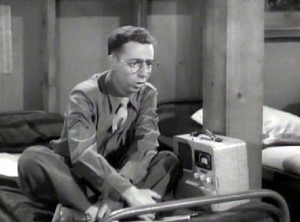 It’s a paper-thin plot, to be sure—but one that is helped immeasurably by sprightly singing and dancing, not to mention novelty performances from acts like Lynn, Royce & Vera…two men and a woman who engage in amusing acrobatics while imitating Fred Astaire & Ginger Rogers. The film also contains a good deal of old-time radio content, beginning with the point in the plot where Mature learns about his good fortune. He actually hears about it secondhand from his solider buddy, Bitsy Slater (played by Arnold Stang—who was sixteen years old at the time this film was made), who’s spending an evening listening to the popular CBS program The Court of Missing Heirs hosted by Charles Victor (as himself, of course). Mature’s fellow soldier buddies are also played by two familiar radio entertainers, vocalist Buddy Clark (also as himself—he’s not credited, but I suspect he did Mature’s “singing” since it sounds a lot like him) and comedian Peter Lind Hayes (as Pete Jackson), whose impersonations of Lionel Barrymore, Ronald Colman and Charles Laughton manage to work their way into the plot.
It’s a paper-thin plot, to be sure—but one that is helped immeasurably by sprightly singing and dancing, not to mention novelty performances from acts like Lynn, Royce & Vera…two men and a woman who engage in amusing acrobatics while imitating Fred Astaire & Ginger Rogers. The film also contains a good deal of old-time radio content, beginning with the point in the plot where Mature learns about his good fortune. He actually hears about it secondhand from his solider buddy, Bitsy Slater (played by Arnold Stang—who was sixteen years old at the time this film was made), who’s spending an evening listening to the popular CBS program The Court of Missing Heirs hosted by Charles Victor (as himself, of course). Mature’s fellow soldier buddies are also played by two familiar radio entertainers, vocalist Buddy Clark (also as himself—he’s not credited, but I suspect he did Mature’s “singing” since it sounds a lot like him) and comedian Peter Lind Hayes (as Pete Jackson), whose impersonations of Lionel Barrymore, Ronald Colman and Charles Laughton manage to work their way into the plot.
Later in the film, Mature’s Johnny takes Lucy’s Terry to a broadcast of Truth or Consequences, hosted by Ralph Edwards, where the young couple wind up as contestants for Edwards’ practical jokes. (For those of us who have always found Edwards a tad unctuous, he is a good enough sport to take a pie in the face during this sequence.) Les Brown (and His Band of Renown) and Freddy Martin are also featured with their orchestras, and Ginny Simms (on loan from Kay Kyser, I’m guessing) also contributes a song.
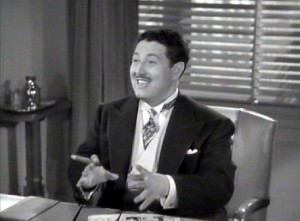 The big radio name in Seven Days’ Leave is Harold Peary, who plays Throckmorton P. Gildersleeve and provides many of the film’s wonderful moments (including a fun rendition of A Touch of Texas, where he sings and dances with Lind-Hayes, Mature and Marcy McGuire). Peary’s appearance in this movie—as well as the Fibber McGee & Molly-Bergen & McCarthy vehicles Look Who’s Laughing and Here We Go Again—inspired studio R-K-O to inaugurate a short series of Great Gildersleeve films from 1942-44. Peary’s Gildersleeve is the executor of Johnny Gray’s estate…so apparently in between running his girdle business and becoming Summerfield’s water commissioner Gildy had a degree in law. (The chuckle-out-loud moment for me is when Gildy introduces Mature and Ball to his Uncle Percy—played by Harry Holman—and then refers to him afterward as “Unk.”)
The big radio name in Seven Days’ Leave is Harold Peary, who plays Throckmorton P. Gildersleeve and provides many of the film’s wonderful moments (including a fun rendition of A Touch of Texas, where he sings and dances with Lind-Hayes, Mature and Marcy McGuire). Peary’s appearance in this movie—as well as the Fibber McGee & Molly-Bergen & McCarthy vehicles Look Who’s Laughing and Here We Go Again—inspired studio R-K-O to inaugurate a short series of Great Gildersleeve films from 1942-44. Peary’s Gildersleeve is the executor of Johnny Gray’s estate…so apparently in between running his girdle business and becoming Summerfield’s water commissioner Gildy had a degree in law. (The chuckle-out-loud moment for me is when Gildy introduces Mature and Ball to his Uncle Percy—played by Harry Holman—and then refers to him afterward as “Unk.”)
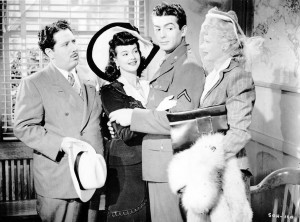 Also in the cast are Latin spitfire Mapy Cortes (as Mature’s jilted girlfriend), Wallace Ford (as Mature’s superior officer) and Walter Reed, playing the “Ralph Bellamy” role as Terry’s fiancé, eventually dumped for Johnny. It’s frothy, morale-boosting entertainment—with plenty of old jokes courtesy of scribes William Bowers, Ralph Spence, Curtis Kenyon and Kenneth Earl…and better-than-average tunes from the team of Jimmy McHugh and Frank Loesser. A New York Times reviewer noted of the film: “…on a thin tire the producers are still getting a little mileage. The audience seemed to enjoy the ride.” I think you will, too.
Also in the cast are Latin spitfire Mapy Cortes (as Mature’s jilted girlfriend), Wallace Ford (as Mature’s superior officer) and Walter Reed, playing the “Ralph Bellamy” role as Terry’s fiancé, eventually dumped for Johnny. It’s frothy, morale-boosting entertainment—with plenty of old jokes courtesy of scribes William Bowers, Ralph Spence, Curtis Kenyon and Kenneth Earl…and better-than-average tunes from the team of Jimmy McHugh and Frank Loesser. A New York Times reviewer noted of the film: “…on a thin tire the producers are still getting a little mileage. The audience seemed to enjoy the ride.” I think you will, too.

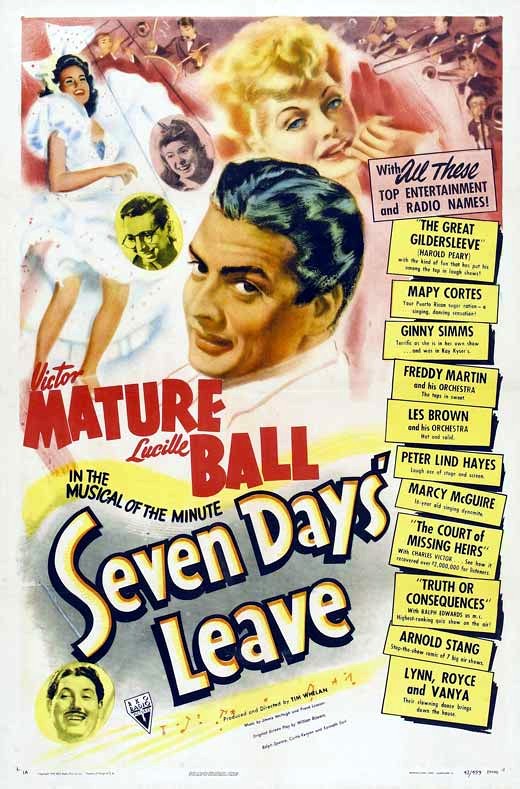

[…] etc. McGuire was a popular nightclub entertainer who was cast in a similar R-K-O outing entitled Seven Days’ Leave (1942) but whose potential was never fully realized by the studio—her best-known turn is […]
[…] in films since the early forties with bit parts in vehicles like My Sister Eileen (1942) and Seven Days’ Leave (1942), and his distinctive appearance and voice made him a natural born “punchline” for other […]